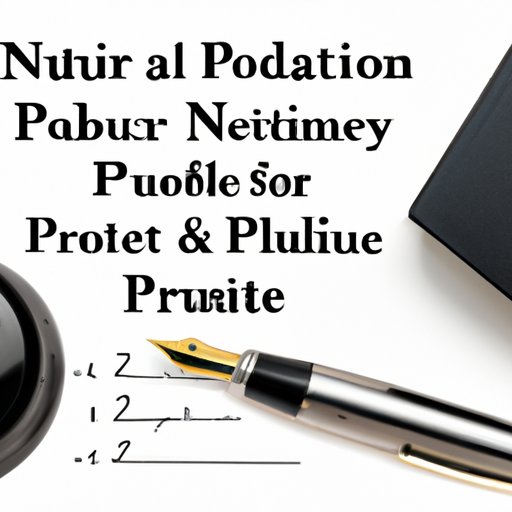
How to Become a Notary Public: A Comprehensive Guide
Have you ever considered becoming a notary public? If you’re someone who values credibility, integrity, and attention to detail, then obtaining a notary public commission may be the perfect career path for you. Notary publics play an important role in verifying the authenticity of signatures, certifying legal documents, and serving as impartial witnesses in various legal proceedings.
In this article, we’ll provide a step-by-step guide on how to become a notary public. We’ll discuss everything you need to know about eligibility requirements, education and training, and notary duties and responsibilities.

Steps to Becoming a Notary Public
Eligibility Requirements
Before you can pursue a notary public commission, you must first ensure that you meet the eligibility requirements. Each state has different requirements, so it’s important to research the specific requirements for your state. Generally, the eligibility requirements include:
- Age: must be 18 years or older
- Residency: must be a legal resident in the state where you plan to serve as a notary public
- Background check: must pass a criminal background check
Required Education
After you’ve confirmed your eligibility, the next step is to complete the required education and training. Most states require that you complete a state-approved course in notary public education, which you can find either online or in-person. Some states also require a notary public bond, which is a type of insurance that protects against financial damages due to any mistakes made by the notary public.
Taking the State Exam
Once you’ve completed the required education, the next step is to take the state exam. The exam typically includes questions on notary laws and regulations, as well as practical scenarios that test your notarial skills. It’s important to prepare for the exam by studying the notary handbook for your state, which should be provided to you during your education and training.
Obtaining a Notary Public Commission
After passing the state exam, you can apply for a notary public commission. The commission is essentially your license to serve as a notary public in your state. You can typically apply for the commission through the Secretary of State’s office or a notary public association in your state. Once your commission is approved, you’ll need to purchase your official notary seal and register it with the state.
The Benefits of Being a Notary Public
Becoming a notary public comes with many benefits, including:
Career Opportunities
There are many career paths you can pursue as a notary public, including notary signing agent, loan signing agent, and mobile notary. Notary signing agents are responsible for notarizing documents for real estate transactions, while loan signing agents specialize in mortgage refinancing. Mobile notaries travel to the location of their clients to provide notary services, making it a flexible and convenient career choice.
Increased Credibility
As a notary public, you’ll have increased credibility in the eyes of clients and employers. Notary publics are seen as impartial witnesses who value integrity and attention to detail, which can help build trust with clients and further your career.
Ability to Provide Important Legal Services
Notary publics play a crucial role in certifying legal documents and verifying signatures. By becoming a notary public, you can provide valuable legal services to individuals and businesses in your community.
Understanding Notary Public Responsibilities
While the duties and responsibilities of a notary public vary by state, there are several common responsibilities that every notary public should be aware of:
Overview of Duties and Responsibilities
As a notary public, your main responsibilities include verifying the authenticity of signatures, certifying legal documents, and serving as an impartial witness. By doing so, you help prevent fraud and ensure that legal documents are legally binding.
Real Estate Transactions
Notary publics often play a key role in the real estate industry, verifying signatures and certifying documents for home purchases and sales. Notary publics who specialize in this area are known as notary signing agents.
Mortgage Refinancing
Notary publics also play an important role in mortgage refinancing, ensuring that all parties involved sign the required documents and that they’re legally binding.
Legal Document Certification
Notary publics can also certify legal documents like powers of attorney, wills, and trusts. By doing so, they ensure that the document is legally binding and that all parties involved understand the implications of signing the document.
The Role of Ethics in Notarization
Importance of Impartiality, Integrity, and Confidentiality
As a notary public, it’s important to maintain a high level of professionalism and ethics. This includes being impartial, acting with integrity, and maintaining confidentiality. Notary publics should avoid conflicts of interest and remain neutral throughout the notarization process.
Maintaining Professionalism
Notary publics should also maintain a professional demeanor when interacting with clients and other individuals involved in the notarization process. This includes dressing in appropriate attire, being punctual for appointments, and using proper etiquette when communicating with clients.
Marketing Yourself as a Notary Public
Creating a Website
One way to market yourself as a notary public is by creating a website that showcases your services, experience, and credentials. This allows potential clients to easily find you online and learn more about your notary services.
Building a Social Media Presence
You can also build a social media presence by creating business profiles on platforms like LinkedIn, Facebook, and Twitter. This allows you to connect with potential clients and network with other professionals in your industry.
Networking with Local Businesses
Another way to market yourself as a notary public is by networking with local businesses in your community. This includes reaching out to real estate agents, mortgage brokers, and law firms to inform them of your services and how you can assist their clients.
Common Mistakes Made by Notaries and How to Avoid Them
Notarizing Documents Incorrectly
One common mistake made by notaries is notarizing a document incorrectly. This can occur if the notary fails to properly identify the signer, fails to administer the oath, or fails to apply their notary stamp or seal correctly. To avoid this mistake, it’s important to carefully review the document and follow proper notarization procedures.
Dealing with Challenging Customer Situations
Another common challenge facing notaries is dealing with challenging customer situations. This may include dealing with angry or upset clients or handling situations where the client doesn’t have proper identification. To avoid this mistake, it’s important to remain calm and professional, and have a clear understanding of your rights and responsibilities as a notary public.
Maintaining Professional Boundaries
Finally, it’s important for notary publics to maintain professional boundaries when working with clients. This includes avoiding any conflicts of interest, not providing legal advice, and maintaining confidentiality. By doing so, you can ensure that you’re providing the best possible service to your clients while also upholding your professional ethics.
Conclusion
Obtaining a notary public commission can be a rewarding career path for anyone interested in legal services and promoting integrity and professionalism in the workplace. By following the steps outlined in this article and understanding the responsibilities and ethics of being a notary public, you can provide valuable services to your clients while also building a successful career.




